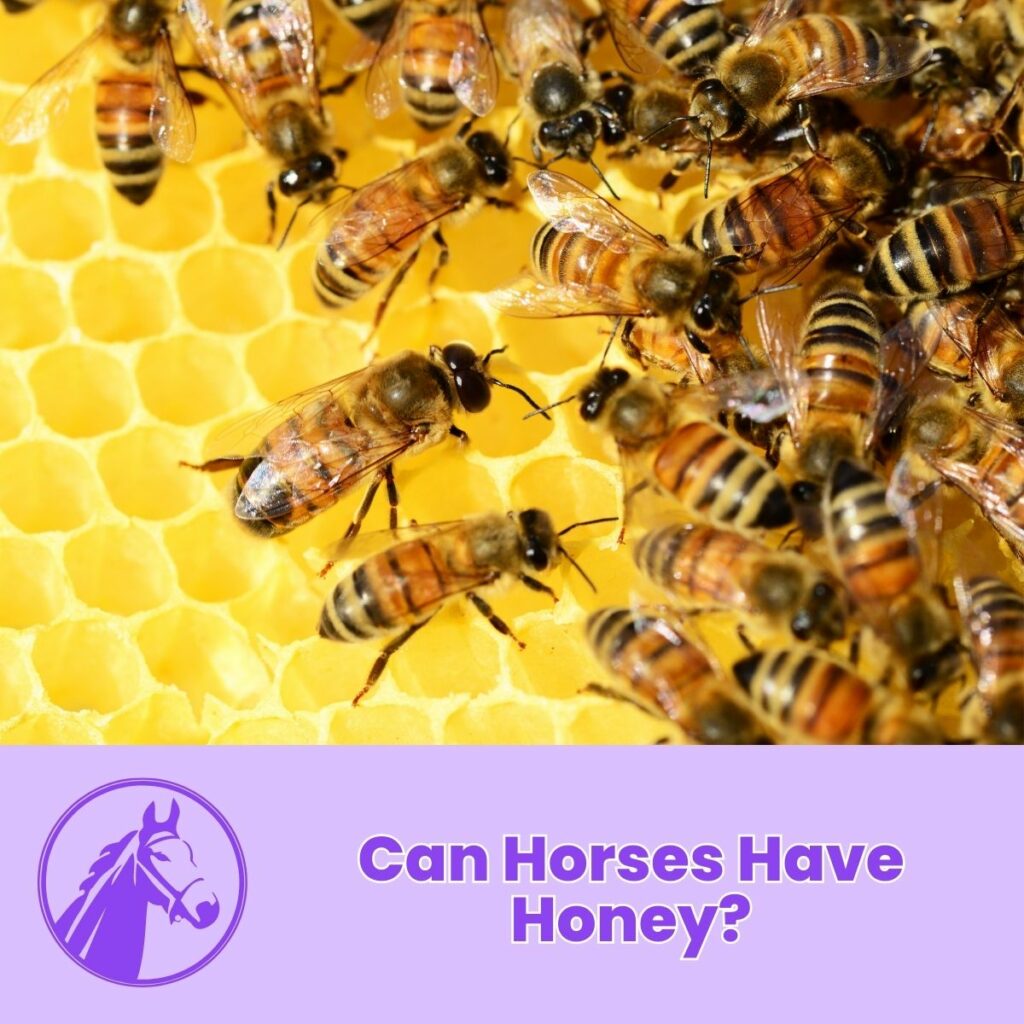As an Amazon Associate we earn from qualifying purchases.
When it comes to the dietary needs of horses, there are several factors to consider. One common question that arises is whether can horses have honey as part of their diet. In this comprehensive guide, we will delve into the topic of equine nutrition and explore whether horses can safely consume honey. Join us as we uncover the truth and provide you with valuable insights into the world of horses and their dietary requirements.
Understanding Equine Nutrition
Before we address the question of whether horses can have honey, it’s crucial to understand the basics of equine nutrition. Horses are herbivores with a digestive system designed for a specific type of diet. Their primary source of nutrition is forage, which includes grasses and hay. Additionally, horses require essential nutrients such as proteins, carbohydrates, fats, vitamins, and minerals to maintain optimal health.
The Natural Diet of Horses
In the wild, horses graze on a variety of grasses and plants, consuming a diet that is high in fiber and low in sugar. This natural diet is essential for their overall well-being, as it supports healthy digestion and prevents certain health issues. As domesticated animals, horses rely on their human caregivers to provide a balanced diet that closely mimics their natural feeding habits.
Can Horses Have Honey?
Now let’s address the main question: Can horses have honey? While honey is a natural and nutritious food for humans, it is not an ideal addition to a horse’s diet. Horses have a unique digestive system that is sensitive to certain foods, and honey falls into that category.
Honey is rich in sugars, including fructose and glucose. While these sugars provide quick energy for humans, they can pose risks to horses. Horses have a limited ability to digest sugars effectively, and excessive sugar intake can lead to various health issues such as colic, laminitis, and metabolic disorders.
Potential Risks of Feeding Honey to Horses
Feeding honey to horses can disrupt their delicate digestive balance and potentially harm their overall health. Here are some of the risks associated with including honey in a horse’s diet:
- Digestive Upset: Horses have a complex digestive system that relies on a carefully balanced microbial population. Introducing honey can disturb the microbial balance, leading to digestive upset, diarrhea, or colic.
- Insulin Resistance: Horses with insulin resistance or metabolic disorders should avoid consuming foods high in sugars, including honey. Excessive sugar intake can worsen insulin resistance, leading to further health complications.
- Weight Gain: Honey is calorie-dense and can contribute to weight gain in horses if fed in large quantities. Maintaining a healthy weight is crucial for a horse’s overall well-being, as excessive weight can lead to joint problems and other health issues.
- Dental Problems: The high sugar content in honey can increase the risk of dental problems in horses, such as tooth decay and gum disease. It’s essential to prioritize a horse’s dental health by providing appropriate forage and dental care.
SEE ALSO : Can Horses Eat Alfalfa Grass?
Optimal Diet for Horses
To ensure the health and well-being of your horse, it’s vital to provide a balanced diet that meets their nutritional needs. Here are some key considerations for creating an optimal diet for horses:
- Forage: The foundation of a horse’s diet should be high-quality forage, such as grass hay or pasture. Forage provides essential fiber, which promotes healthy digestion and prevents issues like colic.
- Balanced Concentrates: In addition to forage, horses may require concentrates such as grains or pelleted feeds to meet their energy and nutrient requirements. Consult with a veterinarian or equine nutritionist to determine the appropriate concentrate for your horse’s specific needs.
- Supplements: Depending on the horse’s individual requirements, certain supplements may be necessary to address specific nutritional deficiencies or support overall health. Consult with a professional to determine the appropriate supplements for your horse.
- Hydration: Access to fresh, clean water is crucial for horses. Ensure that your horse always has access to clean water to maintain proper hydration.
Conclusion
While honey is a delicious and nutritious food for humans, it is not suitable for horses due to their unique digestive system and specific nutritional needs. Feeding honey to horses can pose risks to their health and well-being, including digestive upset, insulin resistance, weight gain, and dental problems.
To ensure your horse’s optimal health, focus on providing a diet that closely resembles their natural feeding habits. Emphasize high-quality forage, balanced concentrates, appropriate supplements, and adequate hydration. By prioritizing your horse’s nutrition, you can support their overall well-being and help them thrive.
Remember, understanding the dietary needs of horses is crucial for their health and happiness. Always consult with a veterinarian or equine nutritionist for personalized advice and guidance to ensure the best care for your beloved equine companion.
Amazon and the Amazon logo are trademarks of Amazon.com, Inc, or its affiliates.

Hey there, I’m Jasmine! I’m a total horse fanatic and have been working with these amazing animals for as long as I can remember. I’m passionate about sharing my love for horses with others and helping them learn more about these majestic creatures. As a professional horse trainer and riding instructor, I’ve developed a deep understanding of equine science and am committed to the welfare of horses. That’s why I founded OwnTheHorse.com, a blog where I share my knowledge and insights with fellow horse enthusiasts. I love connecting with my readers and building a friendly community of horse lovers. Whether you’re a seasoned equestrian or just starting out, I’m here to help and inspire you. Above all, I’m a friendly and compassionate person who truly cares about the well-being of horses and their human companions.

